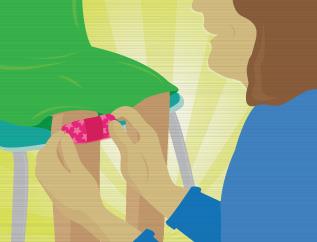Your 2-year-old just spilled the entire carton of milk across the kitchen floor? You’re on it. Your 3-year-old thought it would be funny to dump all the plants upside down in the living room? No worries.

You’ve got your vacuum out sucking soil from the rug faster than your third kid can spit a mouthful of Cheerios all over the stairs. And breaking up rug rat ruckuses and soothing tears while answering the phone are daily occurrences in your house.
It’s safe to say that you’ve got this toddler thing down.
Becoming an excellent mother means a lot of things, and the ability to care for kids is a precious gift. If you’ve noticed your talents in childcare increasing as you care for your own kids, you may have considered the possibility of using your aptitude in the world of education.
It’s easy to doubt yourself if you’re used to giving out gummy bears for potty training and applying Band-Aids to scraped knees but there are many reasons why parents are great at teaching toddlers. Here are just a few.
10 reasons why parents are great at teaching toddlers
1. You’re very familiar with temper tantrums
There’s no doubt that you will see the occasional temper tantrum as an early childhood educator. But since you’re a parent, you’ve probably already seen the worst of it. Teachers are required to uphold certain behavioral expectations in their classrooms, and since you’re already immune to the occasional tantrum, you’ll only be stronger in holding your ground and enforcing healthy rules.
2. You can relate & connect with students’ parents
You’ll be interacting a lot with kids as a teacher, but you’ll also be interacting with parents—quite a bit! If you’re already a parent, it will be easier to relate to your students’ parents and better understand their needs.
“It is much easier to connect with parents, make suggestions for things to do at home, or share funny stories [about] parenting,” says Nancy Metrovich, a teacher and editor for ZUZUTOT. “You have realistic expectations of parents and their time.” This skill will help you in everything from parent-teacher conferences to drop-off and pick-up times.
3. You’re patient
Let’s consider the hours of potty training, the baby’s wailing on the plane trip to visit your parents back home and the constant supervision a wobbly toddler requires. Patience is definitely something you’ve cultivated over the years as a parent, and it will continue to serve you well as a teacher.
The challenges may increase when your one child becomes 12 or 15 children in a class, but with the help of aides, a curriculum and your knack for patience and creative problem-solving, you’ll be helping students graduate from kindergarten before you know it.
4. You know how to get creative
Sticking the kids in front of the television while you’re doing the laundry might be necessary, but most parents hope for their kids to experience more than Sesame Street during their developmental years. During your years as a parent, you’ve probably gotten creative both in how you play with your kids and in finding solutions to everyday problems, such as sulky moods or wetting the bed.
“You understand that kids can get upset easily, and [you know] how to calm them down quickly,” says Metrovich. Whether it’s a screaming kid, a room full of bored students or a child who struggles to learn how to share, creativity is a talent that will help you over many unique obstacles you may experience as a teacher.
5. You’re a master at time management
You need to be a time management ninja when you’re a parent. A single day can consist of getting your child to a doctor’s appointment on time; fitting in household chores; ensuring everyone is fed and clothed; and spending quality time as a family.
As a teacher, it’s important to arrive on time, manage your lesson plans punctually and make sure you use each day and the time allotted for teaching as well as you can. Your skills as a parent probably give you a great appreciation for the value of time, and that should translate well in the classroom.
6. You can roll with the punches
It’s no secret that raising kids can be stressful. Children often do and say things that may throw adults for a loop, and at times, you might feel like you have no idea what you’re doing when it comes to parenting. Being able to laugh at yourself or find the humor in what could be otherwise frustrating situations with your child can make life more enjoyable and help you feel more relaxed.
In the classroom, messes will be made and mistakes will happen; but, your ability to roll with the punches can give even the hardest of days a silver lining.
7. Communication is key
Basic communication skills, both with kids and their parents, will come into play when you’re a teacher. Teaching lessons, conveying instructions and reporting back to parents are all important areas of communicating when it comes to working with a classroom of kids.
“[Parents] speak simply and check for understanding,” explains Karin Hurt, a mother and CEO of Let’s Grow Leaders. “Parents know that just because you ask a kid to do something, it doesn’t mean they heard you. They learn to double-check to ensure the message is clear.” If you’ve ever scheduled a play date, made a dentist’s appointment or even explained house rules to your own kids, you know the importance of prompt and clear communication.
8. Band-Aids & cough medicine are your friends
We used real-time market intelligence from Burning-Glass.com to identify the top skills mentioned in preschool teacher job postings over the past 12 months.* One of the most in-demand skills for preschool teachers is first aid knowledge. It’s imperative that teachers are able to react quickly in case of an emergency, so thorough knowledge of CPR and basic first aid will only give you an advantage.
As a parent, you’ve probably soothed more than one scraped knee and dealt with a few cases of sniffles. You’ll still be required to take certain first aid courses as you train to be a teacher, unless you’re already certified. But, your experience with taking care of aches and pains will give you a greater breadth of knowledge and empathy when it comes to taking care of school children.
9. You know how to develop relationships with kids
“The primary reason parents make good teachers is because they understand how to develop positive relationships with children,” says Dr. Derrick L. Campbell, author of “Promoting Positive Racial Teacher Student Classroom Relationships.”
As a teacher, it’s important you know how to cultivate connections with children. There’s no better way to practice this skill than being a parent. Being able to see the world through the eyes of a child will help you teach well, play well and grow close to your pupils.
10. You know even babies need to grow up someday
You know what it means to hover if you’ve ever heard the term “helicopter parent.” Finding the line between being involved in your child’s life yet letting him or her learn healthy independence is a difficult balance to strike.
As a teacher, you’ll be showing kids how to take on the world and gather knowledge on their own. Education helps students think critically, make wise decisions and, hopefully, make a big difference in the world. Being a teacher is an important calling, and since you understand all kids need to grow and eventually let go, you’ll be able to recognize developmental milestones and celebrate steps toward independence.
You’ve got the skills, so take the leap!
As a parent you already possess many of the skills needed to teach toddlers. Even if you doubt your abilities, it’s likely you have strengths, skills and experience that have already molded you into teacher material.
“Being a parent means you have been a teacher for many years,” says Jessica Parnell, president of Bridgeway Academy and a homeschooling mother.
Interested in learning more about how your skills and experience can translate into an early childhood career? Check out this early childhood education career guide. You’ll be opening a child’s mind to the great and beautiful things of the world before you know it!
Related Articles:
*Burning-Glass.com (Analysis of 35,689 preschool teacher jobs, Apr. 1, 2013 – Mar. 31, 2014)




